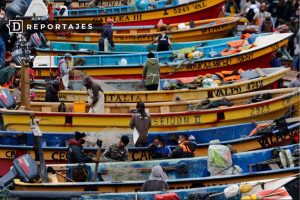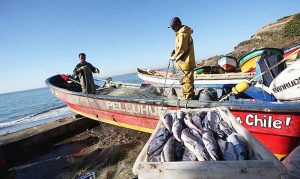Chile’s new fishery law governs the rights of access to, and use of, resources by small-scale fishing communities
This article is by Juan Carlos Cardenas N. (jcc@ecoceanos.cl), Executive Director, Ecocéanos Centre, Chile
If we want everything to remain as it is, everything needs to change.
– Il Gattopardo.Giuseppe Tomasa di Lampedusa,1957
Chile is located in the Southeast Pacific Ocean. It is one of the five most productive and bio-diverse marine areas on the planet. Fishing and aquaculture constitute the second largest sector of the Chilean export economy, with an annual production of 3.4 million tonnes, valued at US $8.5 billion.
This Latin American country is the third largest global exporter of fish, crustaceans, molluscs and marine invertebrates, after Norway and China. It is also the world’s second largest producer of fishmeal, the fifth largest exporter of seaweed for human consumption, the leading exporter of mithilids (bivalve molluscs), the second largest producer of industrially farmed Atlantic salmon (Salmo salar) and the leading producer of Coho salmon (Oncorhynchus kisutch). Both species of carnivorous fish were introduced into Chilean waters from the Northern hemisphere.
After 50 years of operating under an orthodox neo-liberal economic model, the traditional artisanal fishing sector has experienced cultural, technological and social transformations. Profound changes have resulted from the imposition of an extractivist and export-oriented model by the military dictatorship from 1973 to 1990. Subsequent civil governments strengthened this after the controversial parliamentary negotiation that privatized Chilean fisheries through the enactment of Law 20,657 in January 2013.
A law for the rich and powerful
This fishing and aquaculture law eliminates the state as the assigner of property rights, access and use of the country’s fisheries. It transfers this capacity to the market through the creation of a system of fishing licences of indefinite duration—20 years and automatically renewable—and individual transferable fishing quotas (ITQs), bankable and tradable in any legal context. This has affected the conservation of aquatic ecosystems and biodiversity. Today, 53 per cent of Chilean fisheries are over-exploited and collapsed, impacting on the food security and rights of small-scale fishers, coastal communities and Indigenous Peoples.
Recognize that fisheries and coastal territories constitute a common patrimony that cannot be handed over as private property of an undefined nature and made tradable in any legal context
Law 20,657 only allows the owners of legally registered industrial vessels and semi-industrial boats called armadores to have access to fishing licences and annual fishing quotas. These ‘artisanal’ boat owners represent 13 per cent of the approximately 97,000 small-scale fishers officially registered, while the so-called ‘fishermen’ themselves sell their labour to the armadores.
Ten per cent of the total fishing licences were given to 12,901 artisanal boat owners. This fleet, classified as artisanal, includes the so-called lanchas that are 12-18 metres in length and have a hold capacity of up to 80 cubic metres. These semi-industrial boats represent 72 per cent of ‘artisanal’ fishing landings.
Similar exclusion of rights to fishing licences and quotas was applied to the Indigenous Peoples who inhabit the coastal territories; they include the Changos, Mapuches, Lafkenches, Williches, Kawesqar and Rapa Nui. This has allowed business and trans-national groups to buy, sell, rent, mortgage and even inherit these rights, facilitating corporate mergers, trans-nationalization and economic concentration.
The authoritarian productive and social restructuring of the Chilean fishing sector allowed every neo-liberal civilian government of the last decade to be able to implement technological and modernization agendas. By opening up extensive coastal territories and their valuable biodiversity to investment flows, supported by the implementation of 33 free trade agreements, and by providing access under preferential conditions to 65 per cent of the world’s population, Chile has consolidated its role as one of the main exporters of marine products to global markets.
A society’s spine
Along the 4,200 km of coastline and 30,000 km of protected coastline, there are 101,245 artisanal fishermen whose production is equivalent to 32.7 per cent of Chile’s fishery and aquaculture landings. The deep legal, economic and social changes that have occurred over the last decades in the fishing sector have affected the tenure rights for small-scale fishing communities—socially equitable and culturally appropriate—to marine fishery resources and coastal areas, as well as their autonomy to process and sell their products.
In terms of production, Chilean artisanal fishing has been reorienting the destination of part of its catches, becoming a growing supplier of raw materials for industrial fishing companies and processing plants for fishmeal and/or export, while coastal communities are turning to small-scale marine farming, services or tourism.

In this scenario, the increase in women’s participation has given great dynamism and adaptability to the small-scale fishing communities. Currently 22,063 women are owners of boats, fishers, divers, seaweed and mollusc gatherers and fish smokers; they bait fishing hooks; they work in the marine farming, services and tourism sectors. In addition, there is a growing development of small-scale aquaculture activities linked to the production of macro-algae, molluscs and bivalves in 800 cultivation centres. Their production is destined for local markets or intermediaries.
Relief, finally, or…
In September 2022 the Maritime Interests and Aquaculture Commission of the Chamber of Deputies declared the Law 20,657 on fishing and aquaculture “undeniably null and void”. This decision was a response to a decade of sustained struggle by citizen organizations and coastal communities, which had previously led to the conviction of parliamentarians for bribery.
The parliamentary discussion for a new fishing law will begin in June 2024. Given the non-transparent negotiations between the current government and the actual fishing-aquaculture business community, it is anticipated that there will be no fundamental changes. Only secondary aspects are expected to be changed, consolidating a growing integration of the small-scale fishing sector with the industrial sector and export models, consolidating the greatest plundering of rights and public goods that has occurred since the end of the civil-military dictatorship.
In this challenging scenario, the following are some of the demands made by citizens and coastal communities to recover the rights taken away from them by Law 20,657:

Ensure mandatory funded management plans for all fisheries with closed access. These plans must be binding with management decisions, and be subject to periodic evaluations in the Fisheries Councils and the Fisheries Management Committees. This will ensure transparency and full participation of coastal communities. After decades of intense commercial exploitation, there are still 17 commercial fisheries for which the Chilean State lacks information about those who are responsible for management.
All these demands can be met. A democratic, sustainable and equitable fishing policy can be created to ensure gender and social rights only through the mobilization of citizens and communities.
For more
Undoing a Great Wrong
https://icsf.net/wp-content/uploads/2024/02/Sam_90_art-08_Report_Undoing-a-Great-Wrong.pdf
Chile will have a new Fisheries Law in 2024
https://weareaquaculture.com/politics/chile-will-have-a-new-fisheries-law-in-2024
New General Law on Fisheries and Aquaculture No. 20/657, Chilean Government
https://www.subpesca.cl/portal/617/articles-60001_recurso_1.pdf